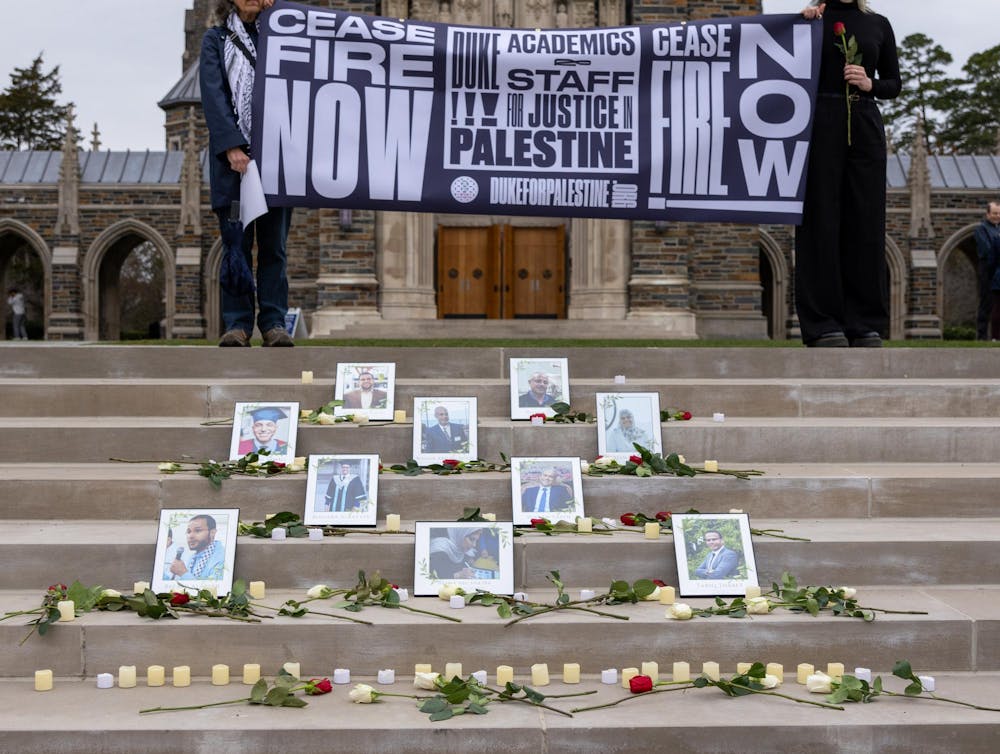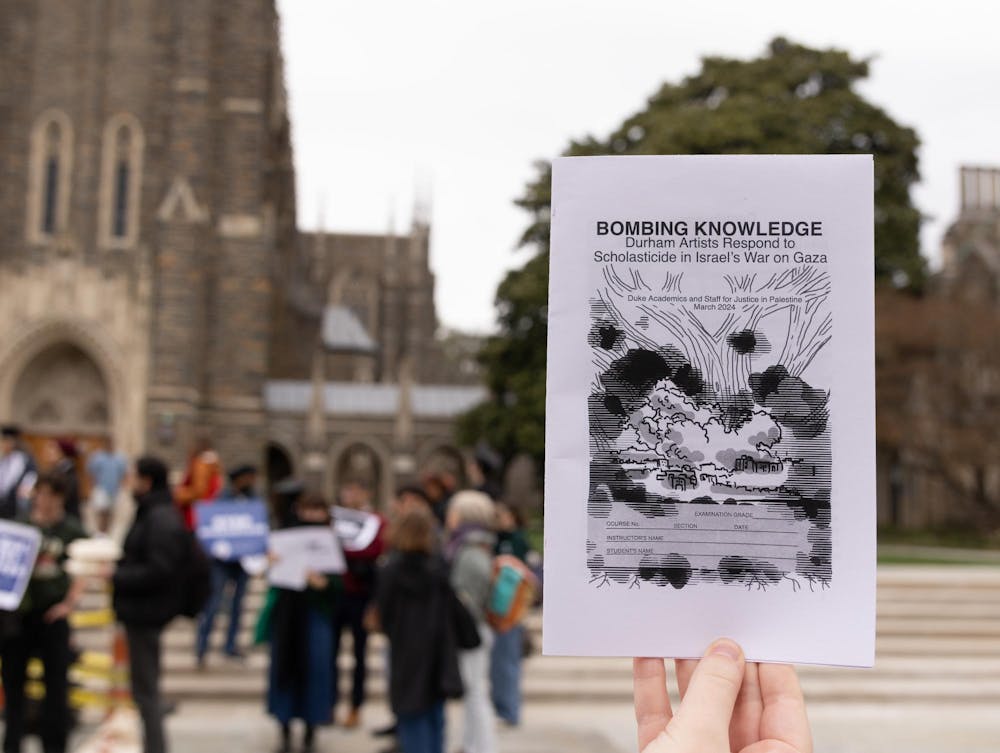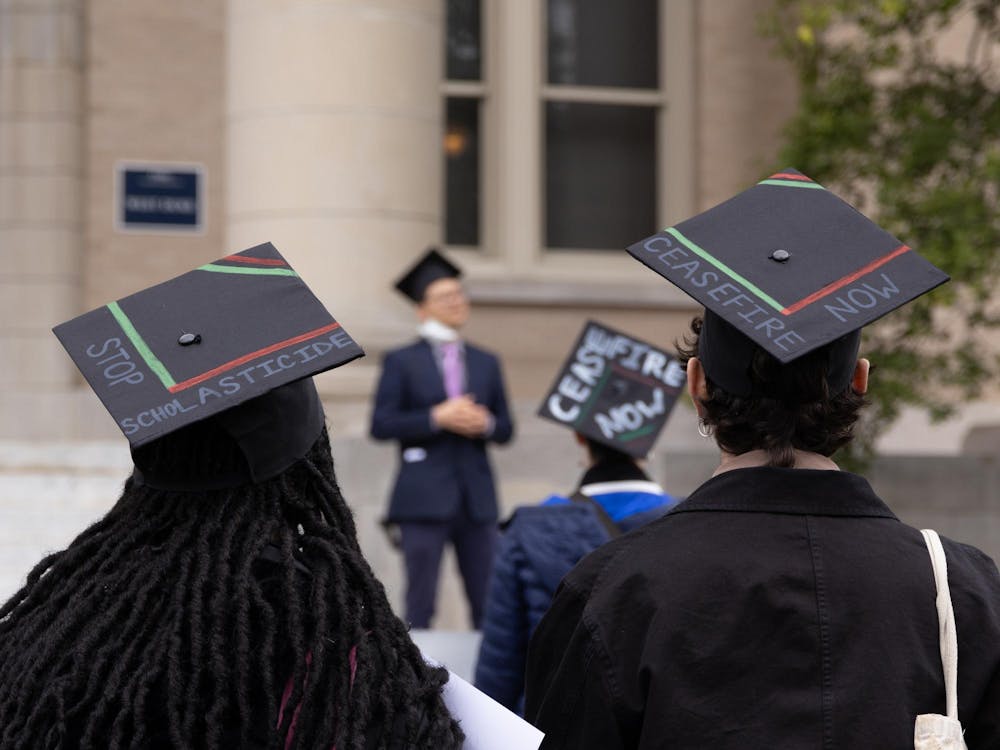Nearly 100 faculty, staff and students gathered Friday in front of the West Duke building to demand that Duke speak out against Israel’s bombardment and invasion of the Gaza Strip as part of the ongoing Israel-Hamas war.
After a short speech, the group moved to the front of Duke Chapel to hold a vigil mourning the killing of teachers and educators in Gaza. The event, organized by Duke Academics and Staff for Justice in Palestine, was called “Stop Scholasticide” in reference to the deaths of Palestinian educators and students in Gaza.
Karma Nabulsi, emeritus fellow in politics and international relations at Oxford University, first coined the term “scholasticide” in 2009, describing it as “systematic destruction of Palestinian education by Israel” in order to fight deep-rooted Palestinian tradition and culture.
The protest featured a song, poems and seven speakers, each a faculty member, staff member or student at Duke.
Since the start of the war, Israel’s retaliatory strikes in Gaza have destroyed many buildings, including schools and universities. The United Nations’ Office for the Coordination of Humanitarian Affairs said in January that nine in every 10 schools have suffered “significant damage.”
The vigil emphasized the importance of education in Palestinian culture and the role of educators — at Duke and in Gaza — in the war. Participants placed candles and flowers on the steps of the Chapel next to pictures of deceased professors from Palestinian universities and schools.

“Imagine if an occupying force destroyed N.C. Central University, Duke University, UNC-Chapel Hill, Durham Tech and N.C. State and told you it was your fault,” said Frances Hasso, professor of gender, sexuality and feminist studies. “Imagine if it destroyed all of our K-12 schools and told you it was our fault.”
The protesters distributed zines with art and profiles of deceased Palestinian educators. The zine, titled “Bombing Knowledge: Durham Artists Respond to Scholasticide in Israel’s War on Gaza” and coordinated by Adam Rosenblatt, associate professor of the practice of the international comparative studies program, underscored the importance of education in Palestinian culture.
In addition to art, poems, and short comics, the zine contained lists of universities destroyed by bombs and notable professors killed in Gaza. On the back of the zine was a picture of the Chapel with bombs surrounding it, captioned “What if it was Duke?”
“Duke must say that there's no path to safety, not for Palestinians and not for Jews, not there and not here, while Israel destroys all the places for thinking, teaching and learning,” Rosenblatt said.

Beyond calling for an end to the “scholasticide,” faculty and staff also called for a permanent cease-fire in Gaza. Some speakers, including a nurse at Duke Hospital and a member of Jewish Voice for Peace, also connected their experiences within the US healthcare system to the collapsed healthcare network in Gaza.
Anne-Maria Makhulu, associate professor of cultural anthropology and African and African American studies, spoke about her experience living and learning in post-apartheid South Africa. She identified the intersection between South African universities during apartheid and the Palestinian struggle for freedom, and said that more than ever, South African universities are a hub for decolonial thought despite persisting segregationist ideology.
Zeena Fuleihan, a doctoral candidate in the program in literature, read three poems from Palestinian poets, including “If I Must Die” by Refaat Alareer, a poem written just a month before Alareer was killed by Israeli airstrikes in December.
“It's impossible for us to sit in our classrooms without thinking of the classrooms which no longer exist in Gaza, to talk with our colleagues without thinking of the over 200 educators that have been killed in the 147 days of war,” said Calvin Cheung-Miaw, Andrew W. Mellon assistant professor of history. “It's impossible to talk with our students without thinking of the 90,000 students who no longer can go to university.”
Get The Chronicle straight to your inbox
Signup for our weekly newsletter. Cancel at any time.

Claire Cranford is a Trinity first-year and features managing editor for the news department.

